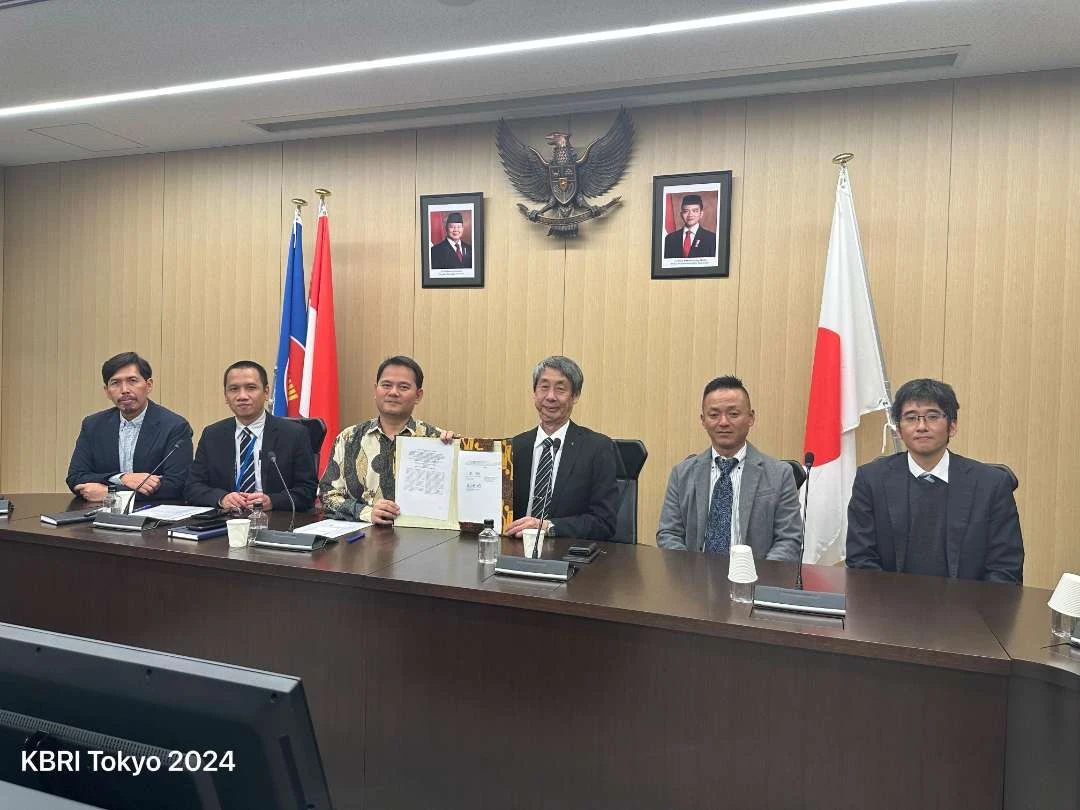Indonesia and Japan have solidified their commitment to advancing the agricultural sector by signing a partnership agreement on developing and utilizing virus-free strawberry seedlings. This initiative is part of the SDGs Business Verification Survey with the Private Sector for Developing and Using Virus-Free Seedlings, aimed at revitalizing agriculture in Indonesia.
The hybrid signing ceremony was held on December 16, 2024, between Indonesia’s Directorate General of Horticulture, Ministry of Agriculture, and JICA Kyushu. Attendees included Muhammad Taufiq Ratule, Director General of Horticulture, who participated virtually, alongside other prominent figures such as Economic Function Coordinator of the Indonesian Embassy in Tokyo, Sunan Jaya Rustam, and Agricultural Attaché, Muhammad Muharram Hidayat. Representing Japan, Professor Hitoshi Kinouchi, Director of Kinouchi-Farm Co., Ltd., signed on behalf of the Japanese stakeholders.
Strengthening Bilateral Agricultural Ties
This agreement symbolizes the strong bilateral relations between Indonesia and Japan, reflecting a shared commitment to sustainable agricultural practices. The Indonesian Ambassador to Japan, Heri Akhmadi, emphasized the strategic nature of this partnership, stating:
“This collaboration demonstrates Indonesia and Japan's commitment to improving agricultural productivity and achieving the Sustainable Development Goals (SDGs). It’s a tangible example of the two nations' efforts toward sustainable agriculture.”
His remarks, delivered by Sunan Jaya Rustam, highlight how this collaboration aligns with global initiatives to ensure sustainable development and food security.
Innovation in Indonesia’s Horticulture Sector
Director General of Horticulture, Dr. Muhammad Taufiq Ratule, underscored the significance of this partnership during his speech from Jakarta:
“This partnership marks a new era for Indonesia’s horticulture sector and sustainable agricultural development. Thanks to the support of the Indonesian Ambassador, this initiative showcases the strength of diplomatic relations between Indonesia and Japan.”
The introduction of virus-free strawberry seedlings is expected to revolutionize Indonesia’s strawberry farming industry by improving yield quality and reducing crop losses caused by plant diseases. The project integrates advanced agricultural techniques and practices developed in Japan with the local expertise of Indonesian farmers, creating a model for sustainable horticulture.
Driving Sustainable Development Goals (SDGs)
The partnership directly supports global SDG initiatives, particularly Goal 2 (Zero Hunger) and Goal 12 (Responsible Consumption and Production). Virus-free seeds contribute to healthier crops, higher yields, and better income for smallholder farmers. Additionally, the knowledge transfer from Japan to Indonesia strengthens local farming communities by equipping them with modern agricultural skills and technologies.
Looking Ahead: A New Horizon for Agriculture
As the partnership progresses, both nations aim to ensure the widespread adoption of virus-free seeds across Indonesia. With continued collaboration, the project has the potential to expand beyond strawberries, addressing broader agricultural challenges and contributing to the economic resilience of Indonesia’s rural communities.
This partnership between Indonesia and Japan is a testament to the power of international cooperation in driving sustainable agricultural innovation. By focusing on quality and productivity, the two nations are paving the way for a more resilient and productive farming sector in Indonesia.
Read More






 Wednesday, 04-02-26
Wednesday, 04-02-26







